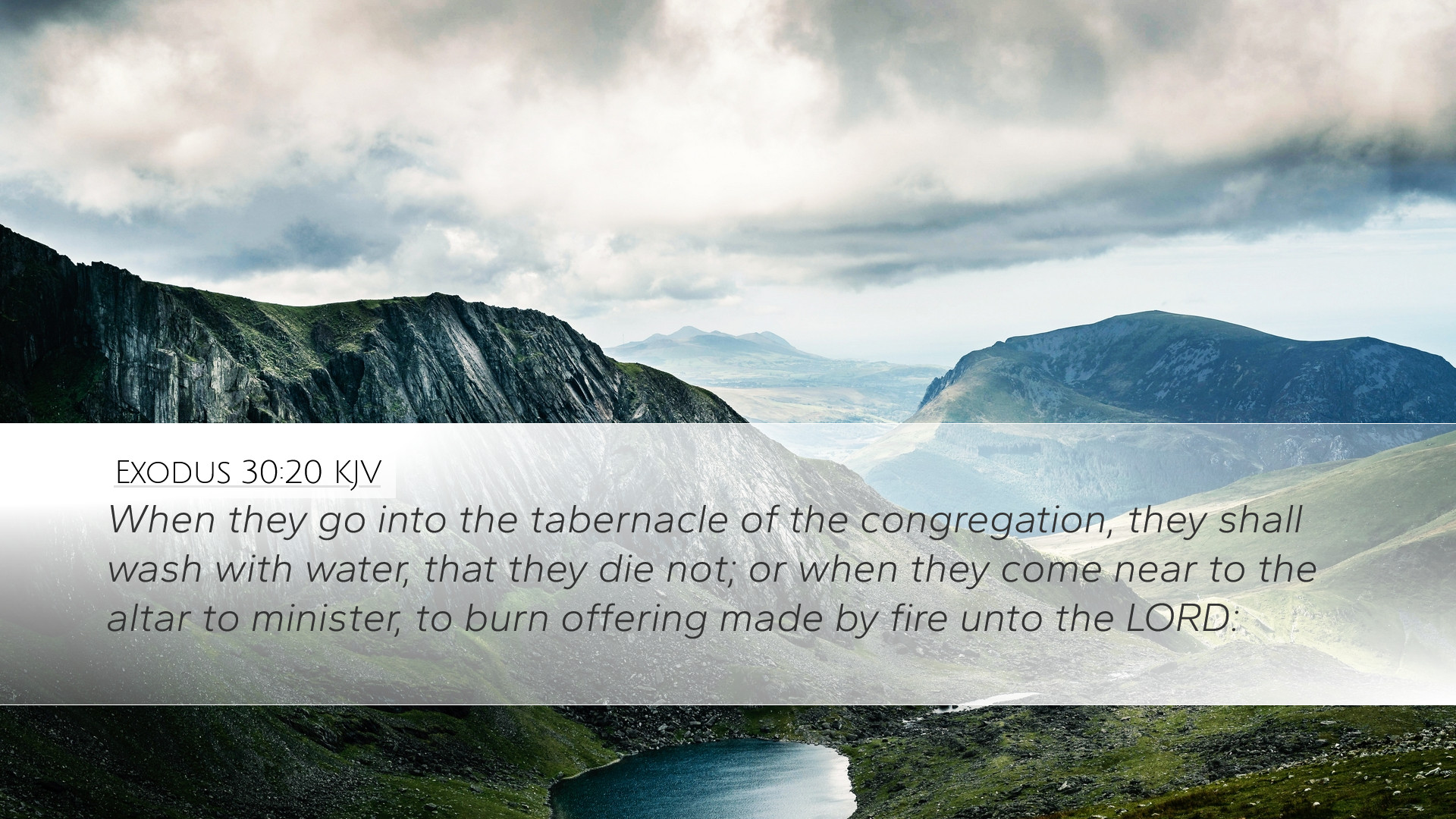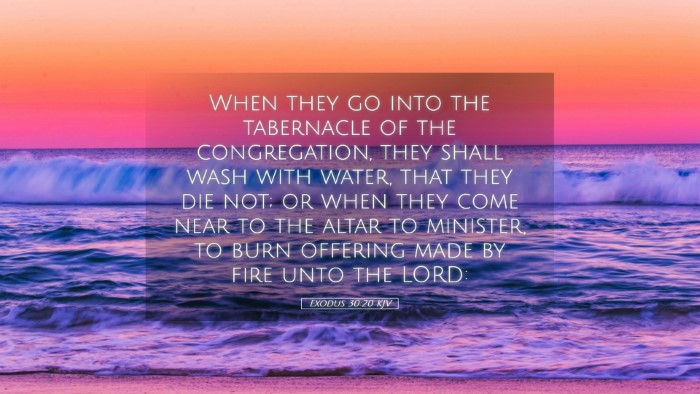Commentary on Exodus 30:20
Exodus 30:20 states: "When they go into the tabernacle of the congregation, they shall wash with water, that they die not; or when they come near to the altar to minister, to burn offering made by fire unto the LORD."
Introduction
This verse emphasizes the necessity of purification for the priests who minister in the sanctuary and at the altar. The requirement to wash with water serves not merely as a ceremonial act but symbolizes the overarching theme of holiness and preparation necessary to approach God. Various public domain commentaries provide deeper insights into its implications and applications.
Insights from Matthew Henry
Matthew Henry underscores the significance of the washing command as an essential preparation for entering into God's presence. He elucidates that this requirement of washing represents a broader spiritual truth—that one must be clean both outwardly and inwardly to serve the Lord effectively.
- Holiness Required: Henry stresses the importance of holiness in service to God, quoting, "They must wash lest they die," indicating that approaching God without proper preparation is perilous.
- Symbolism of Water: Henry further elaborates that the water symbolizes not only the cleansing of physical dirt but also the spiritual cleansing that is essential for any who serve God.
- Consistency in Practice: He emphasizes the need for consistency in this practice, as it must be a continual reminder of one’s need for spiritual purity whenever approaching the sacred.
Insights from Albert Barnes
Albert Barnes provides a theological reflection on the necessity of washing before ministry, noting that it points to general principles of worship that transcend the specifics of Old Testament rituals.
- Sacred Duties Require Preparation: Barnes posits that the act of washing symbolizes the need for spiritual readiness in all sacred duties. He expresses that ministers must first purify themselves spiritually and morally before engaging in worship and serving others.
- The Seriousness of Service: He highlights the severity of the consequences for neglecting this command, suggesting that it serves as a warning that entering into the Lord's service unprepared leads to severe repercussions.
- Correlating with New Testament Teachings: Barnes connects this principle to New Testament teachings, illustrating that believers today must also approach God with clean hands and pure hearts, echoing the New Covenant's call for holiness.
Insights from Adam Clarke
Adam Clarke delves into the practical aspect of the injunction, examining its cultural and historical context while also highlighting its spiritual ramifications.
- Historical Context: Clarke points out that the washing was a public acknowledgment of the priest's role as intermediaries between God and the people. Their cleanliness was paramount to the integrity of the ministry.
- Spiritual Interpretation: He interprets the washing as a metaphor for the necessity of being cleansed from sin through repentance and faith, signifying the ultimate spiritual preparation necessary for anyone who desires communion with God.
- Relevance for Today's Believer: Clarke asserts how this ritual translates into the life of a contemporary believer, reminding them of the constant need for spiritual refreshment and cleansing through the Word and Spirit.
Theological Implications
The command in Exodus 30:20 has enduring theological implications, emphasizing that:
- God's Holiness: It reflects God's perfect holiness and the required reverence when approaching Him. The verse underscores that God's standards of holiness are non-negotiable.
- Role of Mediators: The priests act as mediators between God and the people, indicating that those who serve in such roles bear a great responsibility to maintain purity and integrity.
- Symbolism of Water: The significance of water goes deeper, representing the need for ongoing cleansing from sin through Christ—a vital realization for New Testament believers.
Conclusion
Exodus 30:20 is a profound verse that outlines the critical necessity of preparation, cleansing, and holiness when approaching God. The insights drawn from the commentaries of Henry, Barnes, and Clarke remind us that these principles are foundational for anyone seeking to minister effectively and meaningfully in God’s service.
As we consider this verse, it urges us to examine our own lives as we engage in acts of worship and service—calling us to a deeper commitment to spiritual purity and readiness to stand before our Creator with honor and reverence.


